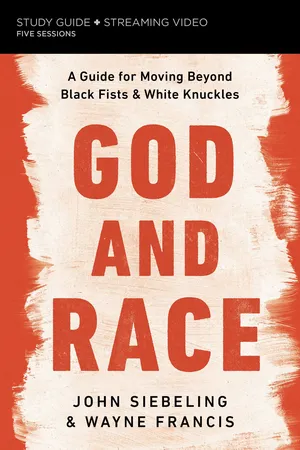
God and Race Bible Study Guide plus Streaming Video
A Guide for Moving Beyond Black Fists and White Knuckles
- 128 pages
- English
- ePUB (mobile friendly)
- Available on iOS & Android
God and Race Bible Study Guide plus Streaming Video
A Guide for Moving Beyond Black Fists and White Knuckles
About this book
How you—and your church community—can play a part in ending racism.
Pastors John Siebeling and Wayne Francis—whose thriving congregations are the embodiment of diversity—have pooled their insights and experiences to help others have conversations about racism. Many churches and leaders have sought their counsel, hoping to emulate their success, and yours can too.
This study guide has everything you need for a full Bible study experience, including:
- The study guide itself—with discussion and reflection questions, video notes, and a leader's guide.
- An individual access code to stream all five video sessions online (you don't need to buy a DVD!).
God and Race provides a non-threatening means for pastors, church leaders, and churchgoers to speak to each other about this difficult and pervasive problem. In this study, Wayne and John show how neither black fists nor white knuckles are the answer to the problem, but that what is needed are open hands, open hearts, and open minds. Together, they:
- Examine the White-Black tension from both perspectives.
- Answer all the uncomfortable questions we're afraid to ask—regarding ourselves, our families, our work and relationships, and the church.
- Discuss seven key statements that they believe the church needs to acknowledge today—including that racism is a real problem, that it's more than just a spiritual issue, and that the Gospel is the solution.
- Provide practical steps anyone can take to become part of the solution.
In the Gospels, we see how the crowds came to Jesus because he talked about real issues and was not afraid to engage in the important issues of his day. In the church of today, we need to be doing the same: only by recognizing, addressing, and openly dialoguing about the racial tension in America can we begin to work toward real solutions together.
Streaming video access code included. Access code subject to expiration after 12/31/2027. Code may be redeemed only by the recipient of this package. Code may not be transferred or sold separately from this package. Internet connection required. Void where prohibited, taxed, or restricted by law. Additional offer details inside.
Frequently asked questions
- Essential is ideal for learners and professionals who enjoy exploring a wide range of subjects. Access the Essential Library with 800,000+ trusted titles and best-sellers across business, personal growth, and the humanities. Includes unlimited reading time and Standard Read Aloud voice.
- Complete: Perfect for advanced learners and researchers needing full, unrestricted access. Unlock 1.4M+ books across hundreds of subjects, including academic and specialized titles. The Complete Plan also includes advanced features like Premium Read Aloud and Research Assistant.
Please note we cannot support devices running on iOS 13 and Android 7 or earlier. Learn more about using the app.
Information
SESSION ONE
OPEN YOUR HANDS
Welcome
Consider
Read
Dear friends, let us love one another, for love comes from God. Everyone who loves has been born of God and knows God. Whoever does not love does not know God, because God is love. This is how God showed his love among us: He sent his one and only Son into the world that we might live through him. This is love: not that we loved God, but that he loved us and sent his Son as an atoning sacrifice for our sins. Dear friends, since God so loved us, we also ought to love one another. No one has ever seen God; but if we love one another, God lives in us and his love is made complete in us. . . .God is love. Whoever lives in love lives in God, and God in them. This is how love is made complete among us so that we will have confidence on the day of judgment: In this world we are like Jesus. There is no fear in love. But perfect love drives out fear, because fear has to do with punishment. The one who fears is not made perfect in love.We love because he first loved us. Whoever claims to love God yet hates a brother or sister is a liar. For whoever does not love their brother and sister, whom they have seen, cannot love God, whom they have not seen. And he has given us this command: Anyone who loves God must also love their brother and sister.— 1 JOHN 4:7–12, 16–21
Watch
Discuss
Respond
Pray
| Name | Request/Praise |
SESSION ONE
BETWEEN-SESSIONS
PERSONAL STUDY
Day One: The Pain of Racism
Table of contents
- Cover Page
- Title Page
- Copyright Page
- Streaming Video Access
- Ebook Instructions
- Contents
- Introduction
- How to Use This Guide
- Session 1: Open Your Hands
- Session 2: Start In Your Heart
- Session 3: What About Your Home?
- Session 4: Use Your Influence
- Session 5: A House That Looks Like Heaven
- Closing Words
- Leader’s Guide